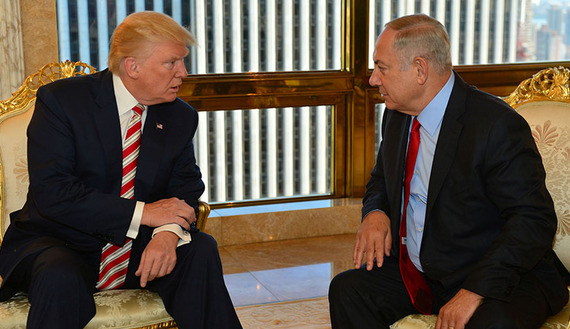
As Israeli Prime Minister Benjamin Netanyahu leaves for his first White House visit with President Donald Trump, a key goal will be curtailing Iran’s financial and military support for allies in the region that have targeted the Jewish state. Top of the list is Hezbollah.
Netanyahu will urge the U.S. to drive a wedge between the Lebanese Shiite group and Iran, through harsh sanctions that will make Tehran think twice about extending support, said Israel Katz, intelligence minister and a member of Israel’s Security Cabinet. Hezbollah’s military wing is considered a terrorist organization by much of the West. The group also operates as a political party that’s deeply enmeshed in Lebanon’s government and society.
“Hezbollah lives off money and advanced weaponry from Iran,” Katz said in an interview. “There need to be paralyzing sanctions on Hezbollah with a very credible threat of sanctions on Iran if it doesn’t stop doing this.”
New Leaf
When he lands in Washington next week, Netanyahu’s priority will be to turn over a new leaf with the White House after eight years of acrimony. Israel continued to receive substantial financial and military support from its longtime ally throughout Barack Obama’s presidency. But the two leaders disagreed on policy toward the Palestinians and Iran. And the relationship grew particularly icy after Netanyahu denounced Obama’s Iran nuclear deal — which curbs the country’s atomic program for a decade but enshrines its ability to enrich uranium — in a speech to the U.S. Congress.
Israel still sees Iran’s nuclear aspirations as an existential threat. With the nuclear deal now in place and difficult to undo, Netanyahu’s focus has turned to enforcing its details, limiting missile production, and curbing Iran’s sway in the region. That influence has grown as Iranian ally Bashar al-Assad gained the upper hand in Syria’s civil war.
As the new U.S. administration takes a more belligerent tone toward Iran, Israel sees an opportunity to roll back the clock to a time when Washington saw Tehran as part of an “axis of evil.” Trump has imposed new sanctions on Iran for ballistic missile testing, and is considering labeling its Revolutionary Guard Corps as a terrorist organization.
“We see a new and very close alliance on the question of Iran, something that has changed from the past U.S. administration,” Katz said in an interview in Tel Aviv. “The president has recognized that it’s the biggest financial backer of terrorism around the world.”
‘All of Lebanon’
Israel and Hezbollah clashed repeatedly during Israel’s years-long occupation of southern Lebanon. They fought a monthlong war in 2006, during which Israeli bombing displaced about 1 million people and destroyed hundreds of miles of roads.
If there’s another conflict, “Israel wants U.S. cooperation, or at least to make sure it’s looking the other way,” said Joshua Teitelbaum of the Begin-Sadat Center for Strategic Studies.
Since 2006, Hezbollah has replenished its arsenal with higher-quality missiles that can hit much of Israel. “Because the size of the threat now is much bigger, the size of the Israeli reaction in the next war will mean that all of Lebanon will be targeted,” Katz said. “Therefore all international parties should have an interest in weakening Hezbollah.”
While the U.S. and Israel may agree on that goal, there’s an obvious obstacle to achieving it. A defeat for Assad in the Syria civil war would have cut the link between Iran and Lebanon. Instead, Assad’s army — with support from Iran, Russia and Hezbollah — has turned the tide against the mostly Islamist rebels, many of whom received Western backing.
Israel will press the Trump administration to seek an accord in Syria that will squeeze Iran and Hezbollah out of the country, Katz said. But U.S. influence in Syria has waned as its allies there suffered defeats, while Russia’s is growing. And Trump has expressed admiration for Russian President Vladimir Putin and spoken of a potential alliance to defeat Islamic State in Syria.
‘Russians Need America’
Katz acknowledged that “Russia is now close to the Iran-Hezbollah axis.” He said the U.S. can help wean it away, because “the Russians need America in other places around the world.” Netanyahu and Putin have also established their own diplomatic channel to minimize sources of conflict in Syria, and keep weaponry out of Hezbollah’s hands.
Netanyahu may also discuss with Trump how to cope with the possibility that Iran could one day pursue a nuclear bomb. Israel will seek to tighten intelligence-sharing and forge a joint plan on what steps to take when the deal ends and most limits on Iran’s nuclear capabilities expire, said Michael Oren, a deputy minister in the prime minister’s office. Iran has repeatedly denied that its nuclear program has a military component.“Iran will soon be in a position to legally develop their nuclear program,” Oren said. “How do you protect Israel from this deal when it expires? That’s something Netanyahu will want to discuss with Trump.”
BLOOMBERG

Leave a Reply
You must be logged in to post a comment.